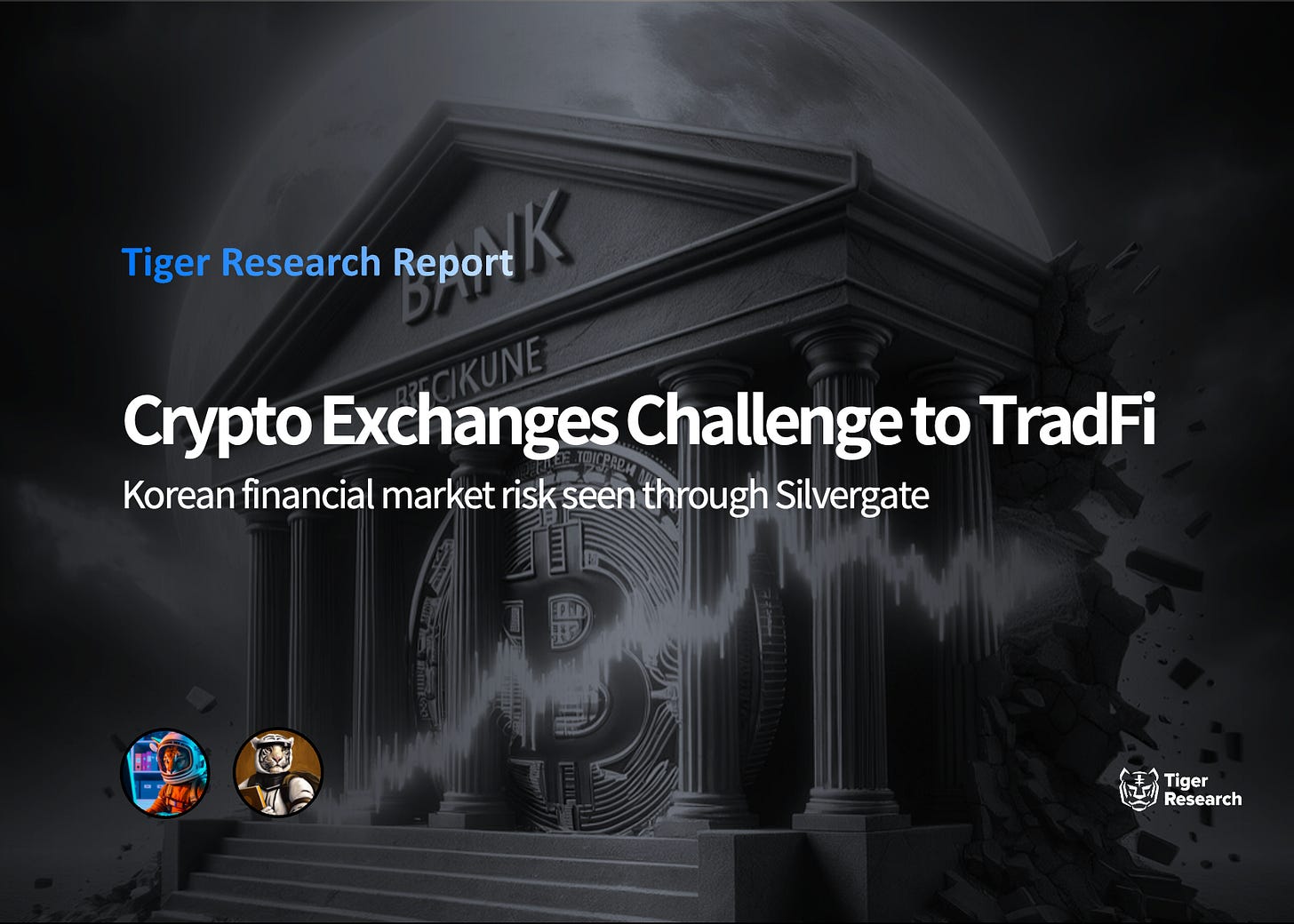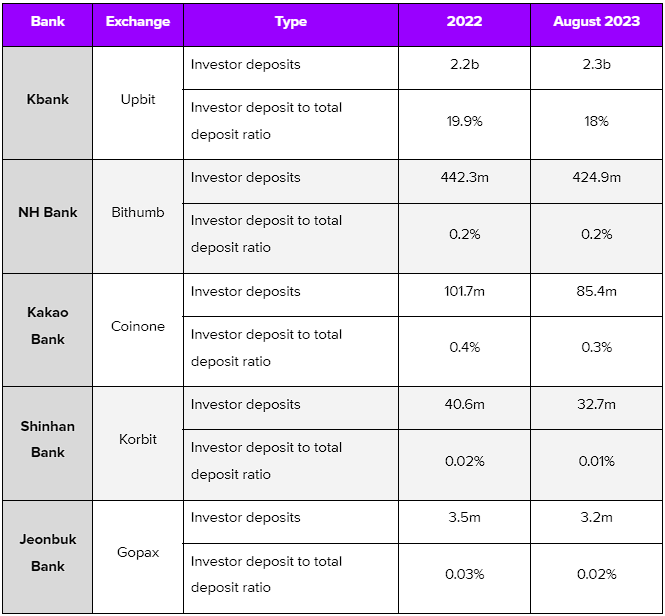
TL;DR
With the growth of crypto markets, their impact on traditional financial markets has become more pronounced in recent years. One instance is the aftermath of the FTX bankruptcy which led to the voluntary liquidation of Silvergate Bank.
Similar potential risks are found in South Korea, where 70 percent of deposits from Kbank are from its exchange partner Upbit.
There are many solutions that can address these potential risks, such as standardized frameworks and multilateral relationships between banks and exchanges.
Introduction
In recent years, the growth of the cryptocurrency market has been accompanied by a stronger influence on traditional financial markets. Sometimes, events occur that shake the foundations of the existing financial system. One such instance is the voluntary liquidation of Silvergate Bank in March 2023, a well-known pro-cryptocurrency bank in the United States. The decision to liquidate Silvergate Bank is believed to have been triggered by the aftermath of the FTX bankruptcy. Silvergate's decision to liquidate was triggered by the aftermath of the cryptocurrency exchange FTX’s bankruptcy. FTX and its related companies were significant customers, accounting for 10% of Silvergate's total assets.
After the FTX collapse, distrust began to spread throughout the crypto market, leading to large-scale asset withdrawal requests. Since Silvergate Bank was virtually built on the crypto industry, with nearly 80% of its deposits related to cryptocurrencies, it was bound to experience a rapid outflow of funds. 68% of all deposits were withdrawn in the fourth quarter of 2022 alone, around the time of FTX's bankruptcy. In order to stem the outflow, Silvergate began to cash out its holdings hastily and suffered heavy losses in the process. While the dust has settled now that Silvergate has filed for voluntary liquidation, the aftermath could have sent shockwaves through traditional financial markets if it had triggered multiple risks. Moreover, Silvergate had borrowed approximately $4.3 billion from the Federal Home Loan Bank of San Francisco shortly before its collapse, further highlighting the danger of triggering a chain reaction due to its failure.
The potential risks arising from the relationship between traditional banks and crypto exchanges
This close relationship between traditional finance and the crypto market can have significant implications for the financial markets as a whole. In particular, the relationship between banks and crypto exchanges has been highlighted as a potential risk factor, as we saw in the Silvergate case. This risk arises because banks and crypto exchanges are systemically interconnected. User investments on crypto exchanges are deposited to banks, which then manage the funds to generate profits.
Depositing crypto investor funds: An investor deposits funds to a bank for the purpose of investing in crypto assets.
Crypto Exchange Corporate Account Deposit: To trade on a specific crypto exchange, an investor sends funds to a corporate account in the name of said crypto exchange.
Bank management of funds: The funds deposited in the corporate account of the crypto exchange will be used by the bank to finance high-liquidity loans.
While it is common for banks to operate with deposited funds, the high price volatility and fast-moving nature of the cryptocurrency market are likely to pose a number of risks. As a result, banks linked to cryptocurrencies may experience frequent large-scale withdrawal requests, such as bank runs, and specialized risk management strategies will be essential to protect against these potential risks.
The dangers of South Korea's financial markets due to Upbit skewing
Some argue that a similar case to Silvergate may also happen in South Korea. Kbank, an affiliated bank of South Korea's No. 1 cryptocurrency exchange Upbit, is one such place. According to the National Assembly audit of state affairs on October 27, 2023, the bank has a high percentage of cryptocurrency-related deposits related to cryptocurrencies, reaching 20%. The report further revealed that the ratio once reached 50% by the end of 2021 when the crypto market was booming. It was even dangerously close to 70% when including Upbit's corporate funds. This is a disproportionately high ratio compared to other exchanges and has raised many concerns, including the question of whether Kbank has simply become a safe deposit box for Upbit. In comparison, NH Bank, an affiliated bank of Bithumb - which is the second largest cryptocurrency exchange in Korea - has only 0.2% of its total deposits related to cryptocurrency, which is significantly lower than Kbank.
Cryptocurrency exchange customer deposits and percentages
There are three possible explanations for the high proportion of cryptocurrency-related deposits in Kbank:
The winner-take-all nature of the cryptocurrency
The Korean '1 exchange = 1 bank' system
Kbank's low deposit holdings
As of the end of 2022, Kbank accounted for only about 1.15% of domestic bank deposits, the lowest among domestic internet banks.
After FTX's bankruptcy, Kbank now classifies Upbit investors' deposits as corporate deposits and does not use them to fund loans, giving the impression that Kbank's potential liquidity issues have been resolved. However, some observers remain cautious, noting that in 2022, the bank used at least 10% of Upbit investors' deposits to fund loans in highly liquid assets such as government bonds and repurchase agreements (RPs).
Are crypto markets really threatening traditional financial markets?
Financial authorities and institutions are already aware of the risks that the cryptocurrency market can potentially pose, so the likelihood of an event like Silvergate occurring in the near term is somewhat low. However, we believe that it is still necessary to learn from the Silvergate case and take measures to prevent potential risks.
First, it will be necessary to strengthen investor protection measures to relieve the burden of investors from the fear of losing their funds. The Korea Federation of Banks also recognized this problem. In July 2023, it released the 'Guidelines for the Operation of Virtual Asset Real Name Accounts', which requires a minimum of USD 2.2 million and a maximum of USD 15.6 million in reserve deposits to fulfill the liability for damages to virtual asset users. However, as the reserve amount is lower than the average daily deposit by exchanges, it is necessary to require a higher level of reserve.
Reserve readiness by cryptocurrency exchange
Next, it is necessary to prevent liquidity problems in advance by keeping the deposits of virtual asset exchange investors separate. Unlike Kbank, NH Bank (Bithumb) and Kakao Bank (Coinone) keep their deposits separate. Shinhan Bank (Korbit) is trying to mitigate risks by sending them to a corporate receiving account first and transferring them to the bank 72 hours after the initial deposit.
Conclusion
As the cryptocurrency market grows and its link to the traditional financial market becomes stronger, the degree of risk is also increasing. In South Korea, it has been pointed out as a major risk factor by showing anomalous deposit structure, with the phenomenon of cryptocurrency deposits in Kbank centered on Upbit being a major example.
To reduce these risks, active responses from financial authorities and related organizations are essential. Here are some solutions:
Standardized frameworks and regulations between crypto and traditional financial systems need to be established.
Multilateral relationships between banks and exchanges, as seen in the Japanese and Taiwanese crypto markets, should be established to encourage healthy competition and eliminate anomalous deposit ratio structures.
Innovation in traditional financial markets is needed. In line with the expansion of the cryptocurrency market, traditional financial markets need to strengthen their risk management and control systems.
We believe that these measures are necessary in order to contribute to the development of the cryptocurrency market and the traditional financial market in a mutually beneficial way, rather than becoming a threat to each other.
Participate in our 1-minute survey to help improve our weekly reports. As a thank you, you can download Tiger Research's original "2023 Country Crypto Matrix" spreadsheet, an all-in-one spreadsheet for the global virtual asset market analysis after finishing the survey.
Disclaimer
This report has been prepared based on materials believed to be reliable. However, we do not expressly or impliedly warrant the accuracy, completeness, and suitability of the information. We disclaim any liability for any losses arising from the use of this report or its contents. The conclusions and recommendations in this report are based on information available at the time of preparation and are subject to change without notice. All projects, estimates, forecasts, objectives, opinions, and views expressed in this report are subject to change without notice and may differ from or be contrary to the opinions of others or other organizations.
This document is for informational purposes only and should not be considered legal, business, investment, or tax advice. Any references to securities or digital assets are for illustrative purposes only and do not constitute an investment recommendation or an offer to provide investment advisory services. This material is not directed at investors or potential investors.










